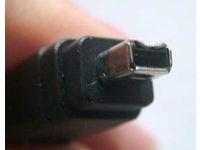IEEE Approves 3.2 Gb/s IEEE 1394 High-speed Serial Bus Specification
Piscataway (NJ) - IEEE 1394, better known under the brand names of Firewire and i.Link, will get a speed bump before the end of the year: The IEEE has approved the new IEEE 1394-2008 specification that provides support for a bandwidth of up to 3.2 Gb/s.
Firewire has come a long way. From the initial development by Apple in the late 1980s, to the technology’s completion in 1995 and surge in popularity in the early 2000s, the technology has become a serial bus interface common in Sony and Apple computers as well as a range of consumer electronics devices such as video cameras.
Most IEEE 1394 devices are still running on the S400 (400 Mb/s) specification despite the fact that S800 (800 Mb/s) was introduced with the IEEE 1394b spec in 2003. The problem with this spec was a different connector than the design that was used for S400. However, bilingual cables that are compatible with S400 and S800 ports are available.
The IEEE today announced that it formally approved the IEEE 1394-2008 spec, which will introduce support for S1600 (1.6 Gb/s) and S3200 (3.2 Gb/s) while offering full backwards compatibility with S400 and S800 ports. Down the road, it is expected that IEEE 1394 will scale up to 6.4 Gb/s.
Firewire and i.Link desperately need the upgrade in order to remain competitive with USB, which will receive an upgrade to 4.8 Gb/s in version 3.0.
The IEEE 1394-2008 spec will become available in October, according to the IEEE. The USB 3.0 spec is expected to be published by the end of this year.
Get Tom's Hardware's best news and in-depth reviews, straight to your inbox.

Wolfgang Gruener is an experienced professional in digital strategy and content, specializing in web strategy, content architecture, user experience, and applying AI in content operations within the insurtech industry. His previous roles include Director, Digital Strategy and Content Experience at American Eagle, Managing Editor at TG Daily, and contributing to publications like Tom's Guide and Tom's Hardware.
-
shachar2 1394 800MB version failed, different connector and highly priced controller meant that equipment manufacturer kept the old 400MB version and didn't adopt the 800MB version.Reply
It remains to be seen if mistakes were learned and if the s1600 & s3200 will be adopted -
velocityg4 If cabling and controllers are not outrageously expensive this would be great. Not only for Hard Drives and other consumer/pro devices but for greater than Gigabit networking speeds. Since 10Gb is so freaking expensive.Reply
